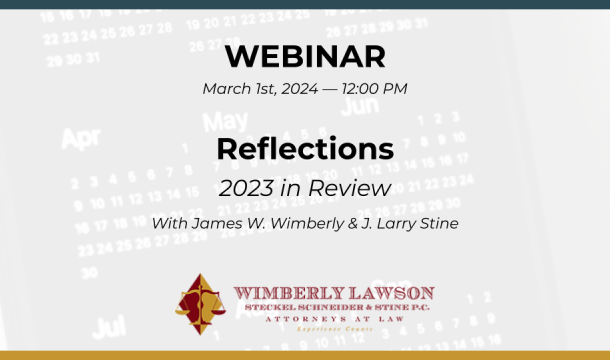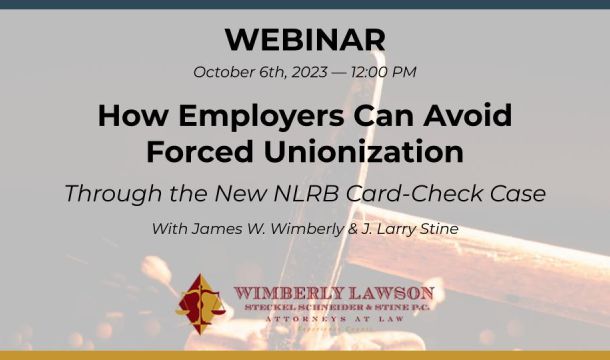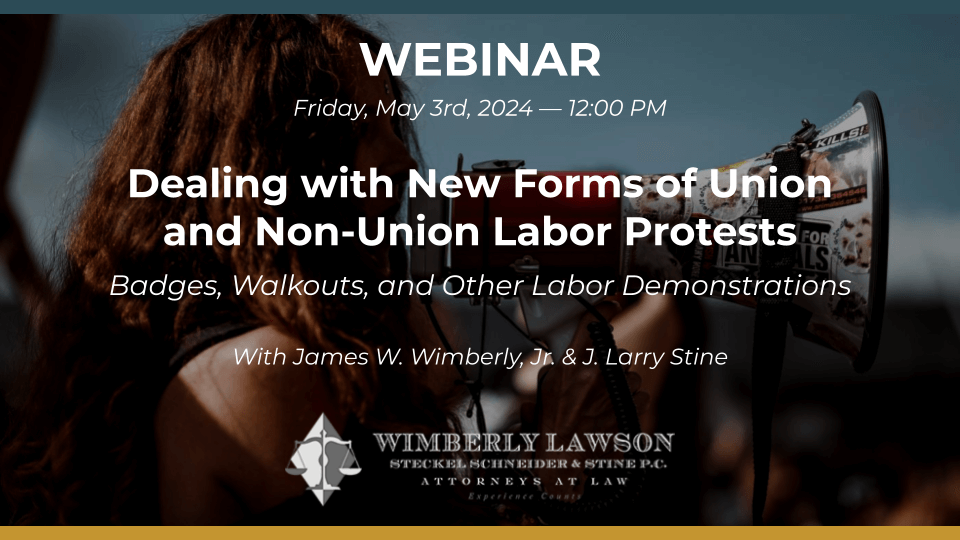NLRB Explains What Employer Rules Are Unlawful and How to Make Them Lawful
On March 18, 2015, the NLRB General Counsel (GC), Richard Griffin, issued a report attempting to reduce some of the mass confusion over the NLRB's policies concerning employer handbooks and other company policies. The GC acknowledges most employers do not draft their policies with the object of restricting conduct protected by the labor law, but states that the law does not allow even well-intentioned rules that would inhibit employees from engaging in protected activities. The main principle is that the maintenance of a work rule may violate the law if a rule has a chilling effect on employees' protected activity. The most obvious way a rule would violate the Act is by explicitly restricting protected concerted activity. However, even if a rule does not explicitly prohibit protected activities, it will still be found unlawful if: (1) employees would reasonably construe the rule's language to prohibit protected activity; (2) the rule was promulgated in response to union or other protected activities; or (3) the rule was actually applied to restrict the exercise of protected rights. The GC states the vast majority of violations are found under the first prong, and the NLRB has issued a number of decisions interpreting whether "employees would reasonably construe" employer rules to prohibit protected activity.
The GC report is divided into two parts. The report compares common employer rules the NLRB has found unlawful with rules it found lawful and explains the reasoning. It covers confidentiality rules, professionalism rules, anti-harassment rules, trademark rules, photography/recording rules, and media contact rules. The second part discusses handbook rules from a recently settled unfair labor practice charge against Wendy's. This part of the report sets forth Wendy's rules that the NLRB initially found unlawful with an explanation, along with Wendy's modified rules.
In discussing unlawful confidentiality rules, the GC memorandum finds a rule "prohibiting employees from disclosing details about the employer" to be unlawful, but a rule stating "no unauthorized disclosure of business secrets or other confidential information" will be lawful. Addressing rules regarding employee conduct with the company and supervisors, the GC memorandum finds a rule "be respectful of others and the company" to be unlawful, while a rule stating "each employee is expected to work in a cooperative manner with management/supervision, co-workers, customers and vendors" to be lawful. In discussing rules regarding conduct towards fellow employees, the GC finds a rule "do not send unwanted, offensive, or inappropriate emails" to be unlawful, but a rule prohibiting "threatening, intimidating, coercing, or otherwise interfering with the job performance of fellow employees or visitors" to be lawful. Addressing rules regarding employee interaction with third parties, the GC finds a rule stating "employees are not authorized to speak to any representative of the media about company matters unless designated to do so by HR" to be unlawful, but goes on to give several examples of lawful rules regarding employee communications with the media. Addressing rules restricting use of company logos, copyrights and trademarks, the GC finds a rule "do not use any company logos, trademarks, graphics, or advertising materials in social media" to be unlawful, but again gives examples of lawful rules protecting employer logos, copyrights, and trademarks.
The GC then addresses rules restricting photography and recording devices. The GC states that a rule prohibiting "use or possession of personal electronic equipment on employer property" is unlawful, apparently because employees should have the right to use personal equipment to engage in a protected activity while on breaks or other non-work time. A single example is given of a lawful rule regulating pictures and recording equipment with the rationale that in context the employees would read the rule to ban news cameras, not their own cameras.
Regarding employer rules restricting employees from leaving work, the GC finds a rule "walking off the job is prohibited" to be unlawful, because it reasonably could be read to include protected strikes and walkouts. On the other hand, the GC finds a rule to be lawful "entering or leaving company property without permission may result in discharge." Regarding employer conflict of interest rules, the GC finds a rule that ”employees may not engage in any action that is not in the best interest of the employer" to be unlawful, but finds other stated rules to be lawful because they include context and examples that indicated that the rules were not meant to encompass protected concerted activity.
In the second part of the report, involving the Wendy's handbook, a number of common employer rules or policies are found to be unlawful. Extremely helpful, however, are a number of lawful handbook rules negotiated pursuant to the Wendy's settlement agreement, governing handbook disclosure, social media, conflict of interests, confidential information, employee conduct, no distribution/no solicitation, and telephone/cell phones/camera phones/recording devices.
Wimberly & Lawson Comments: The NLRB's position on employer handbooks and other personnel policies is very frustrating, and they are going to be very difficult for the average human resource executive, or even the average labor lawyer, to interpret and apply. Further, it is likely that a more employer-friendly NLRB in the future will rescind some of these technical and demanding NLRB case precedents. In the meantime, employers are left in a dilemma of whether to commit significant resources to try to bring their rules in compliance with the revolving NLRB doctrine, or whether to run some risks in this regard. Reasonable people can reach different conclusions as to the best strategy. However, should a union organizing campaign commence with a potential for an NLRB election, it is recommended that employers immediately seek competent labor law counsel to determine whether any of their policies are unlawful and objectionable, in order to minimize liability to the company resulting from illegal policies being in effect during the critical period before an NLRB election.
For a copy of this NLRB memorandum, you can request one from Wimberly & Lawson or you can go to http://apps.nlrb.gov/link/document.aspx/09031d4581b37135.
For questions or additional information call James W. Wimberly, Jr., Martin H. Steckel, or any other attorney at (404) 365-0900 or at jww@wimlaw.com or mhs@wimlaw.com.
Related Content
Get Email Updates
Recent Content

Featured Federalist Article: Text Education in Muldrow v. St. Louis: The Supreme Court Just Made Title VII Cases Easier for Plaintiffs to Win

Judge Invalidates Joint Employer Rule, and Independent Contractor Rule Takes Effect

The Importance of Fairness in Employment to the Law and to Job Satisfaction

Major Employers Challenge Constitutionality of Labor Act

Starbucks' Big Change in Labor Policies




